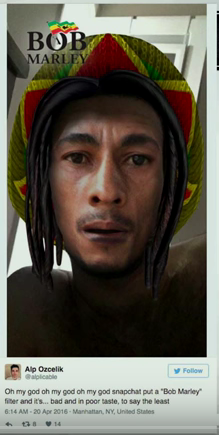Visual messaging app Snapchat was under fire on April 20, Wednesday, following its release of a filter which amounted to a blackface. The filter was intended to honor the late reggae icon Bob Marley by allowing users to take a selfie in Snapchat.
Snapchat users were not ready to see a Bob Marley filter that featured a blackface. It was created to celebrate the April 20 weed-themed holiday but social media audience were angry since fans want to remember the singer more than just a marijuana poster child. Marley became trending on Twitter, as people tweeted comments such as, why it is a good idea to introduce a Bob Marley filter that is a black face.
April 20 is an informal holiday celebrating marijuana that Marley used in his Rastafarian religion. Snapchat said the lens they launched was created with the Bob Marley Estate, Wired has learned.
"The lens gives people a new way to share their appreciation for Bob Marley and his music. Millions of Snapchatters have enjoyed Bob Marley's music, and we respect his life and achievements," a spokesperson from Snapchat told the online magazine when the latter reached out to them.
Many Snapchatters expressed their disgust by what they see on the Snapchat. April 20 was not even Marley's birthday and that the singer's legacy should not just go to pot-smoking.
The intention of Bob Marley's face was to honor the late reggae icon so that users take a selfie in Snapchat then edits the image make the user look similar to Marley, with the brown skin, dreadlocks and colorful hat, according to USA Today.
During the early 19th century, Blackface originated when black performers were prohibited to perform for white audiences, while white performers used paint or cork to darken skin. White performers who wore the BlackFace makeup did that to exaggerate features, and it ridiculed African Americans. Filter resurfaced complaints in the tech industry, which largely has male and white workforce. Such makes it vulnerable to decisions which cannot be perceived by other races.
Privately-owned Snapchat is popular especially among younger users as it focuses on visual images that expire quickly. It provides several filters to add selfies, top hats, rainbow tongues and skeleton. Meanwhile, Spotify honored Marley as well with the release of a playlist.
Newscasters discussed about Snapchat's Bob Marley filter in the following video:





















